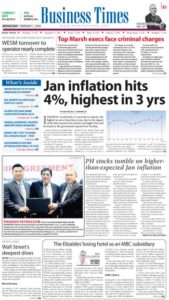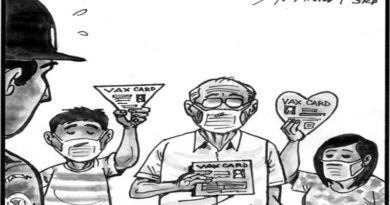MANILA: ECONOMY – ‘Jan inflation hits 4%, highest in 3 yrs’ | Wednesday, February 07, 2018

INFLATION accelerated to 4 percent in January, the highest in more than three years, due to the impact of the first round of tax reform and higher fuel and food prices, the government reported on Tuesday.
January inflation was higher than the 3.3 percent posted in December, and the 2.7 percent recorded a year earlier.
Inflation last hit the 4-percent level in October 2014, when it was recorded at 4.3 percent.
The January 2018 inflation figure came in higher than the 3.5 percent average forecast of economists polled by The Manila Times, and the 3.3 percent projection of the Department of Finance.
It also hit the ceiling of the Bangko Sentral ng Pilipinas’ (BSP) forecast range for the month of 3.5 percent to 4 percent.
Core inflation, which strips out volatile food and fuel prices, climbed to 3.9 percent from 3 percent in the previous month and from 2.5 percent a year earlier.
Citing data from the Philippine Statistics Authority, the National Economic and Development Authority (NEDA) said the faster overall increase in consumer goods prices can be attributed mainly to the 4.5 percent increase in the food and non-alcoholic beverages segment, which constitutes 39 percent of the consumer basket.
The faster price increase of fruits and corn was attributed partly to the lingering effects of successive typhoons that occurred in the last quarter of 2017, it added.
The NEDA said the commodity group of alcoholic beverages and tobacco—comprising only 2 percent of the consumer basket—recorded a double-digit inflation of 12.3 percent from 6.4 percent in the previous month.
Among other non-food commodities that posted higher inflation were transport (3.2 percent from 2.4 percent); restaurant, miscellaneous goods, and other services (3.7 percent from 3 percent); health (2.6 percent from 2.2 percent); and furnishings, household equipment, and routine maintenance of the house (2 percent from 1.9 percent).
The increase in prices of housing, water, electricity, gas, and other fuels — which account for about 22 percent of the consumer basket — slightly eased to 3.7 percent from 3.8 percent in December, partly offsetting the upward pressure on the prices of consumer goods, according to the NEDA.
Train impact
“The higher January 2018 reading was expected by the BSP although it is at the top end of our forecast for the month,” Bangko Sentral Governor Nestor Espenilla Jr. told reporters in a message on Tuesday.
Espenilla said the higher inflation was due mainly to the combined first round effects of the implementation of Tax Reform for Acceleration and Inclusion (Train) law, oil prices, and food to some extent.
But he added that these were temporary drivers of inflation and would eventually stabilize.
“Nevertheless, BSP will be closely monitoring the situation and [we]stand ready to take timely action based on our evaluation of all relevant data,” Espenilla said.
But Finance Secretary Carlos Dominguez doubts that the Train law could have affected January inflation that much.
“I have to look at the figures closely but find it hard to believe that the implementation of Train, which went into effect on 1/1-18 [January 1, 2018], had any significant effect on prices, unless of course merchants took advantage of the law and raised prices on old inventories,” he told reporters in a message on Tuesday.
In an economic bulletin, the Department of Finance explained that the rise in inflation in January may be partly traced to the excessive price adjustment from the sin tax, the sugar sweetened beverage tax in the Train Law in the case of non-alcoholic beverages, and weather disturbances in the case of vegetables.
Of the 4 percent inflation in January, the Finance department said 2.1 percentage points was accounted for by sin products and sugar-sweetened beverages.
Mitigation measures
NEDA said the government must ensure mitigation measures are in place to cushion the transitory inflationary impact of Train law, including price monitoring and prompt action to curb profiteering.
“The push in inflation is partly due to Train, considering particularly the excise on fuel and additional sin taxes,” Socioeconomic Planing Secretary Ernesto Pernia was quoted in a statement on Tuesday.
“With the initial inflationary effects of Train we must ensure faster provision of financial assistance through the unconditional cash transfer program,” the NEDA chief said.
Pernia also reiterated the agency’s call to replace quantitative restrictions on rice imports with tariffs to stabilize the country’s rice supply and lower the price of rice.
“When the quantitative restrictions are replaced by tariffs, the government will also be better able to help enhance the country’s competitiveness and productivity in agriculture.
Revenues from tariff on imported rice will be used to finance government programs for agriculture,” he explained.
Over the medium term, infrastructure development in the next few years and reforms in the energy sector will ease electricity prices, Pernia noted.
Higher trend
Analysts from Maybank King Eng, Security Bank Corp., Land Bank of the Philippines, and IHS Markit told The Manila Times that the inflation rate is expected to trend higher in the coming months.
“Our full-year 2018 forecast of +3.6 percent is under review, with potential for it to be at or slightly above 4 percent now,” Maybank King Eng regional head for Economic Research Suhaimi Ilias said.
Angelo Taningco, economist and assistant vice-president for Security Bank’s Treasury
Group, expects inflation to stay relatively close to the 4 percent upper end of the government’s target range.
“This potentially higher inflation in the coming months could dampen consumer spending and lead to a moderation in GDP (gross domestic product) growth,” he said.
LandBank market economist Guian Angelo Dumalagan said consumer prices are expected to trend higher this year, then slowing toward the end of the year to average at about 3.6 percent.
He said Dumalagan other factors that contributed to the acceleration in consumer prices in January were higher oil prices, the depreciation of the peso, and weather-related supply disruptions.
“The spike in our inflation is caused not by an unhealthy surge in demand, but by an increase in excise taxes, external headwinds, and natural calamities,” the economist said.
“If we take out these factors, we arrive at a picture of a healthy consumer demand that is attracting more investments from abroad. Moreover, we have the Build Build Build program that is expected to improve the country’s productive capacity,” he continued.
IHS Markit senior economist for Asia Pacific Rajiv Biswas said: “While inflation may edge lower if global oil prices pull back later this year, at the moment the direction of inflation pressures is upward, with GDP growth momentum and credit growth also expected to remain strong during 2018.”
Rate hike seen
Analysts said the 4 percent inflation figure might prompt the central bank to hike interest rates sooner.
ING Bank senior economist Joey Cuyegkeng said: “We are reviewing our 2018 average inflation forecast of 3.7 percent for an upward revision likely to be at least at the top end of BSP’s inflation target range of 2-4 percent.”
Cuyegkeng added that second round effects of the Train law are likely to push inflation higher within the year.
“The likelihood of a tightening move at Thursday’s meeting has increased significantly. We are now looking at advancing the timing of our rate hikes and are reviewing our two-rate hike forecast for 2018,” he said.
Meanwhile, ANZ Research economist Eugenia Victorino said the confluence of the tax reform, rising Brent prices and weak Philippine peso underlie the surge in January inflation.
She said that at this rate, headline inflation is expected to breach the upper bound of the central bank’s inflation target range.
“We expect the Bangko Sentral ng Pilipinas to embark on policy tightening commencing with a 25bps (basis points) hike in March,” she concluded.
Maybank’s Ilias priced in a 50-bps hike in the BSP’s key interest rates this year due to the higher January inflation, while IHS Markit’s Biswas said the BSP is expected to tighten monetary policy at least twice in 2018.
“Surging CPI (consumer price index) inflation, strong GDP growth and rapid credit expansion are all combining to put the BSP on a more hawkish stance with monetary policy tightening expected soon,” he said.
COURTESY:
BUSINESS TIMES
.
NOTE : All photographs, news, editorials, opinions, information, data, others have been taken from the Internet ..aseanews.net | [email protected] |
For comments, Email to :
Pahulu Gan – Contributor | [email protected]









